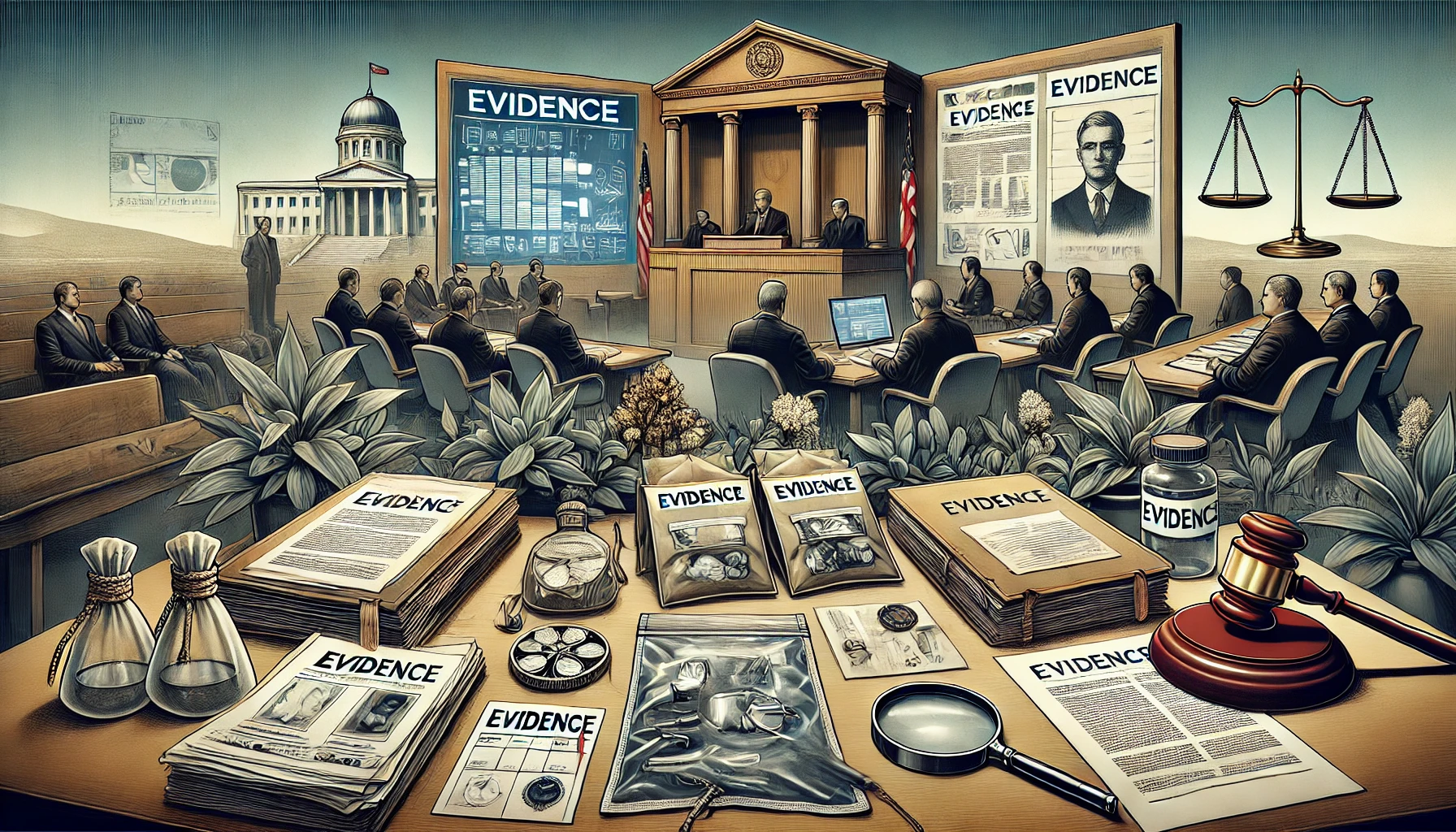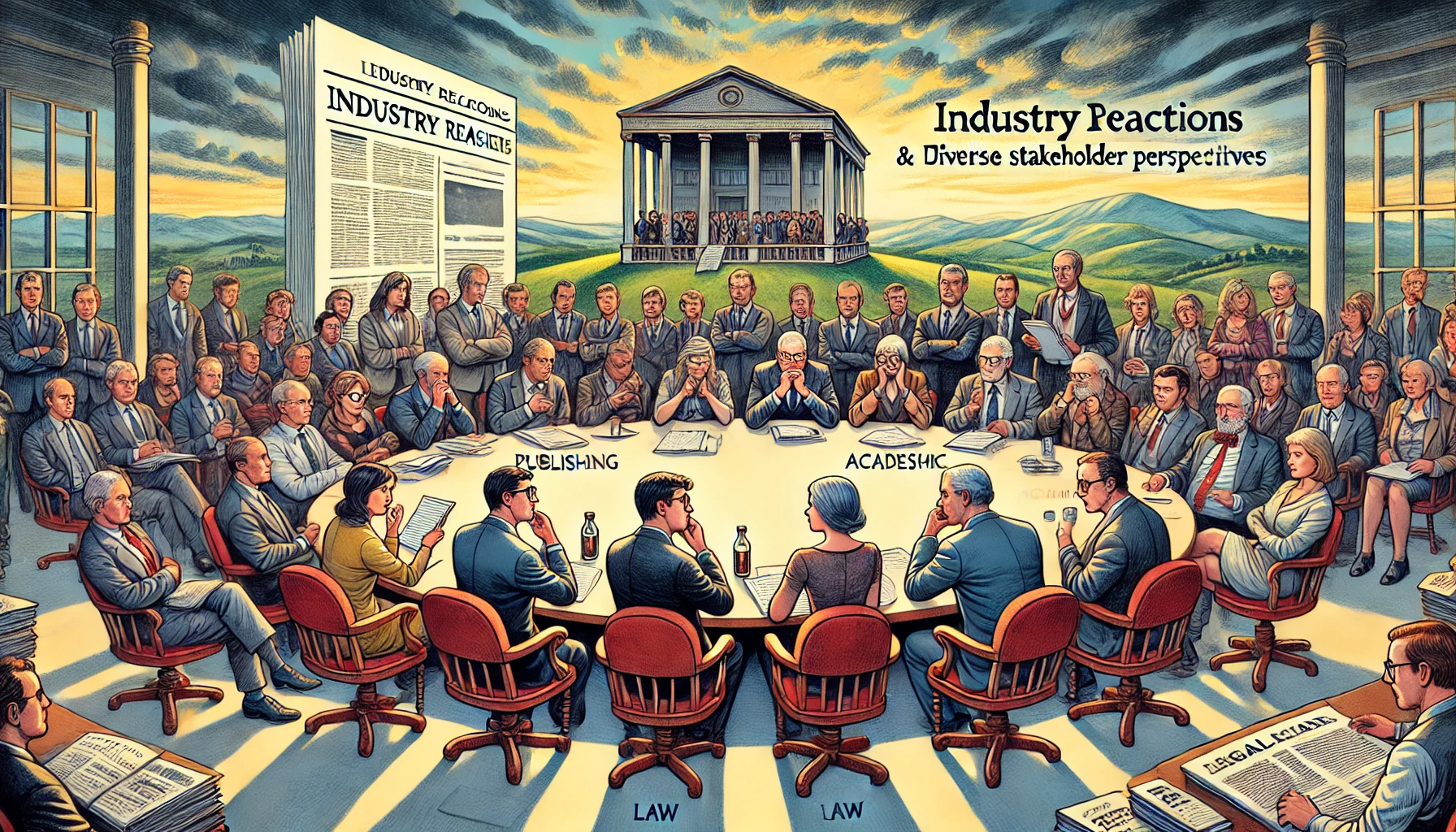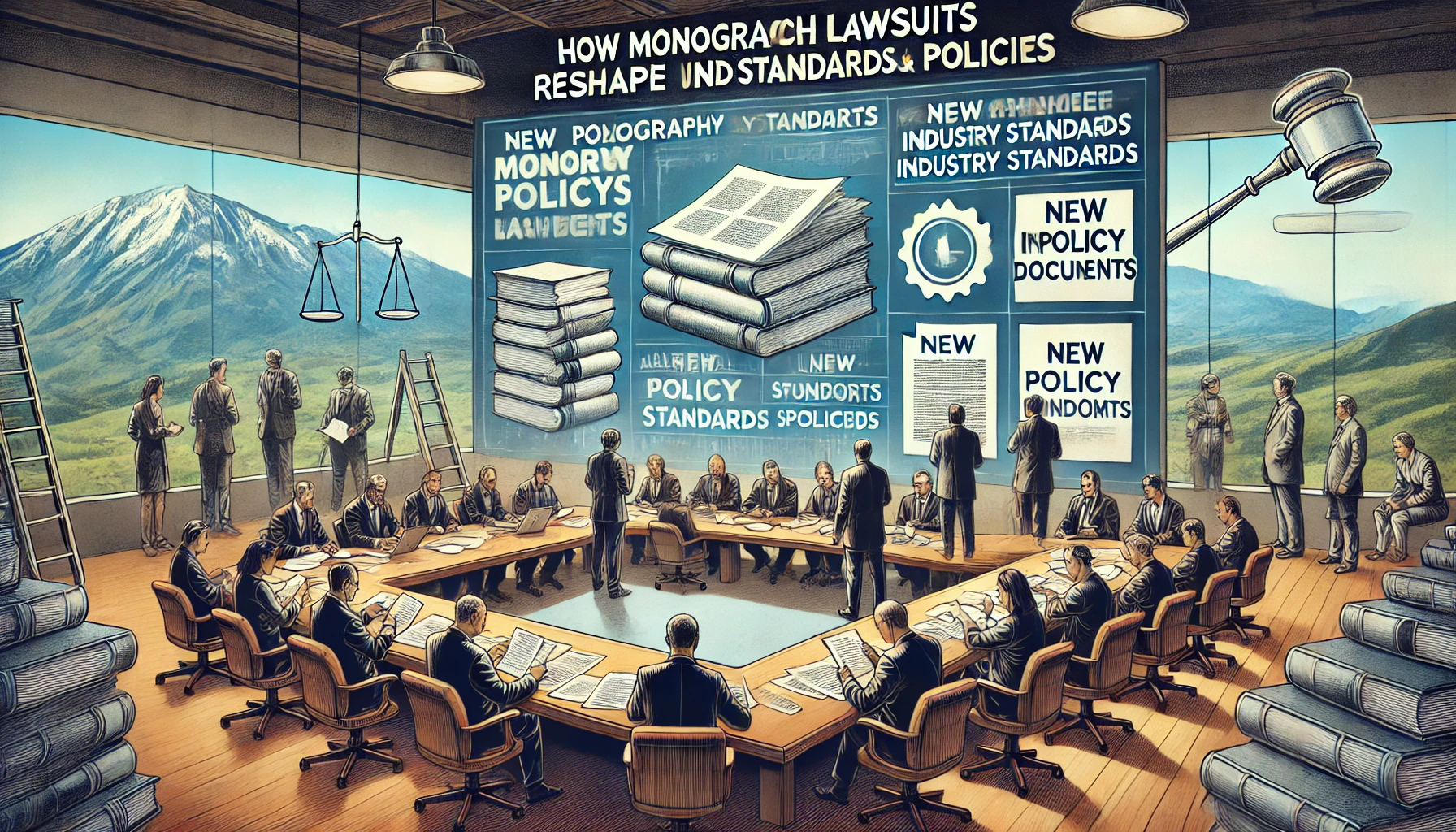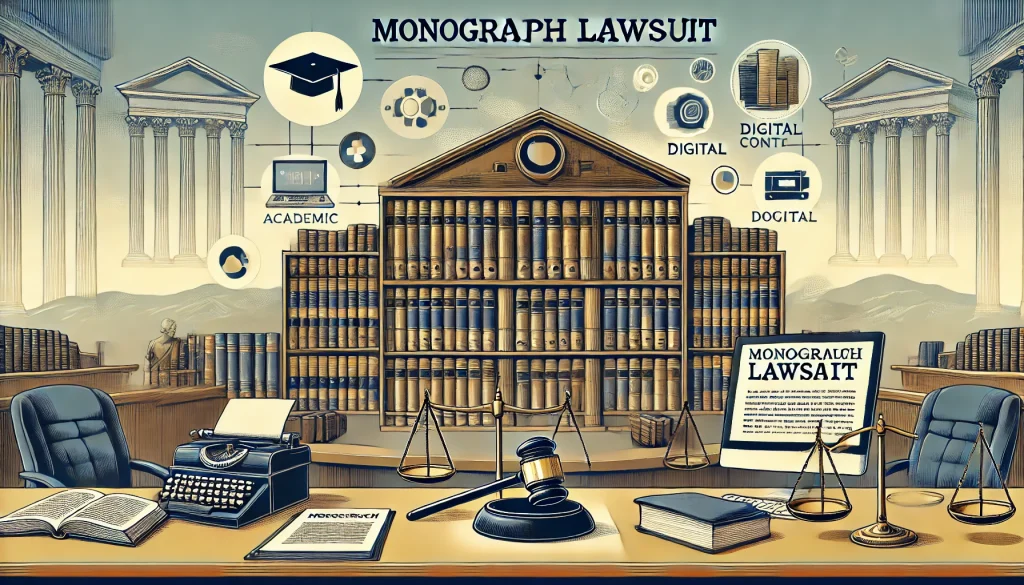The Monograph Lawsuit has captured significant attention due to its potential impact on intellectual property rights within the publishing and academic sectors. This case brings to light key legal challenges surrounding monograph publications, focusing on issues of copyright, authorship, and the fair use of academic work. For many stakeholders, the outcome of the lawsuit could set a pivotal precedent.
At its core, the Monograph Lawsuit addresses complex questions of intellectual property that affect authors, researchers, and publishers alike. As more academic content is digitized and shared, defining the boundaries of ownership and permissible usage becomes increasingly complicated. The lawsuit could reshape how academic materials are accessed, cited, and protected in the future.
The implications of the Monograph Lawsuit extend beyond the involved parties, impacting academic standards and policies industry-wide. Legal experts are closely following this case, as its outcomes could influence future guidelines for intellectual property in academia and publishing, reinforcing the importance of copyright law in protecting scholarly contributions.
Monograph Lawsuit: Overview of the Case and Background
The Monograph Lawsuit centers on disputes over intellectual property rights and ownership of academic monographs. Academic monographs, typically used to convey extensive research, are crucial in fields where detailed analysis and primary sources are essential.
This lawsuit was filed by an academic publisher against another organization, alleging unauthorized usage and distribution of monograph content. At the heart of the case are claims about copyright infringement, royalties, and distribution rights.
The lawsuit sheds light on common industry challenges, such as the fine line between fair use and copyright infringement. With academic materials often shared for educational purposes, defining boundaries remains complex.
- Key Issues in the Case:
- Ownership and usage rights
- Copyright and fair use
- Royalty distribution
The Monograph Lawsuit could ultimately establish guidelines on how monographs can be used, especially in digital formats, highlighting a critical issue in a rapidly evolving field.
Key Legal Arguments in the Monograph Lawsuit
The Monograph Lawsuit brings forth several core legal arguments, primarily focusing on copyright claims and the fair use doctrine. The plaintiff argues that the defendant’s actions breached established copyright laws by redistributing content without explicit permission.
A significant aspect of the case lies in defining “transformative use” — whether the defendant’s usage of the monograph content added enough value to qualify as a new, distinct product under fair use principles. This point has sparked considerable debate among legal experts.
Another argument is based on licensing and compensation. The plaintiff contends that fair compensation was not provided for the use of the copyrighted content. The defendant, however, argues that the monograph was used within legal boundaries meant to facilitate public access to knowledge.
- Central Legal Questions:
- Does the use qualify as “transformative”?
- Are existing copyright laws adequate for digital content?
- Was adequate compensation provided?
These legal arguments in the Monograph Lawsuit could lead to redefining fair use and clarify compensation expectations for similar academic works.
The Role of Evidence and Documentation in High-Stakes Lawsuits
In high-stakes cases like the Monograph Lawsuit, evidence and documentation play a pivotal role in shaping legal arguments and verifying claims. In this case, both parties rely heavily on historical agreements, usage logs, and documented communications to support their positions.

One type of evidence includes documentation of copyright registrations and any licenses provided to the defendant. Proper licensing documentation can clarify whether permissions were granted or whether the defendant acted outside legal bounds.
Digital evidence, such as website logs and file downloads, is also crucial. These logs may show instances where monograph materials were accessed or redistributed, shedding light on the extent of usage.
- Types of Key Evidence:
- Copyright and licensing records
- Access and distribution logs
- Email and communication records
| Evidence Type | Purpose | Potential Impact |
| Copyright Documents | Prove ownership | Establish original rights over content |
| Licensing Agreements | Show permissions | Determine lawful use or infringement |
| Usage and Download Logs | Track access and distribution | Quantify extent of alleged violation |
Through careful analysis of evidence, the Monograph Lawsuit underscores the importance of thorough documentation, especially when dealing with digital content rights and distribution.
How the Monograph Lawsuit Impacts Intellectual Property Rights
The Monograph Lawsuit has a broad impact on intellectual property (IP) rights, particularly for content in academic and publishing circles. Intellectual property rights protect the creations of scholars, ensuring they retain control over their work, but these rights are frequently tested in today’s digital age.
The case highlights concerns about unauthorized sharing and distribution. If the defendant is found liable, it could reinforce stricter IP protection measures for academic content, potentially affecting how materials are shared in educational settings.
Furthermore, the lawsuit emphasizes the need for clear IP agreements, especially when materials are published digitally. Ambiguities in ownership rights and usage agreements can lead to legal conflicts, as seen here.
A potential impact of the Monograph Lawsuit may be the introduction of new IP policies specifically for monographs and academic texts. This could influence educational institutions, publishers, and digital platforms that frequently handle monographic content.
- Potential Outcomes of the Lawsuit:
- Stronger IP enforcement policies
- Clearer licensing terms for academic monographs
- Stricter guidelines for digital distribution and access
By potentially setting a precedent, the Monograph Lawsuit could influence IP rights across the academic publishing sector.
Legal Defenses Commonly Used in Intellectual Property Cases
In the Monograph Lawsuit, the defense strategies often mirror those seen in intellectual property (IP) cases more broadly. A primary defense involves asserting fair use, where the defendant may argue that their use of the monograph content was transformative and did not infringe upon original copyrights.
Another common defense in IP cases is questioning the validity of the copyright itself. If there’s any ambiguity in how the original copyright was established, defendants may claim that the copyright is either invalid or unenforceable, potentially voiding the claims against them.
IP defendants often use a de minimis defense, arguing that their use of the copyrighted material was minimal and thus did not constitute significant infringement. This defense is based on the idea that the alleged infringement is too insignificant to be actionable.
In some cases, defendants claim that they had an implied license. This defense suggests that actions by the copyright holder led the defendant to believe that permission was granted for the usage, even if not explicitly documented.
Common Legal Defenses in IP Cases:
-
- Fair use and transformative argument
- Questioning copyright validity
- De minimis (minimal usage) defense
- Implied licensing claims
These defenses in the Monograph Lawsuit highlight typical strategies employed to mitigate liability and challenge claims in intellectual property disputes.
Monograph Lawsuit: Potential Outcomes and Their Implications
The Monograph Lawsuit could conclude in various ways, each with significant implications for the academic and publishing industries. A ruling in favor of the plaintiff might lead to stricter enforcement of copyright rules in academic publishing, setting a precedent for content use in the field.
If the defendant prevails, it could reinforce the fair use doctrine, potentially expanding permissible usage boundaries for academic materials. This outcome could allow more flexibility for educators, researchers, and institutions in using monograph content under fair use.
Another potential outcome is a settlement. In many IP cases, parties opt to settle to avoid prolonged litigation costs. A settlement might include licensing agreements or royalties, which could provide financial remedies without establishing a strict legal precedent.
Additionally, the court could rule for enhanced transparency in licensing agreements, pushing publishers and institutions to clarify terms around content use. This would likely benefit all stakeholders by reducing future conflicts.
| Potential Outcome | Implications |
| Ruling for Plaintiff | Stricter copyright enforcement in academia |
| Ruling for Defendant | Reinforcement of fair use |
| Settlement Agreement | Royalties or licensing terms without setting a precedent |
| Requirement for Transparency | More precise licensing terms and reduced litigation |
Each possible outcome of the Monograph Lawsuit will influence the handling of academic materials, potentially affecting policies across the publishing and education sectors.
Industry Reactions and Stakeholder Perspectives on the Case
The Monograph Lawsuit has garnered strong responses from key stakeholders, with academic publishers closely watching the proceedings. Many publishers support strict copyright enforcement, arguing that this case highlights the need to protect the intellectual property of authors and researchers.

On the other hand, educational institutions have mixed reactions. Some universities and libraries advocate for fair use, as a ruling limiting access to monograph content could restrict resources available for education and research. These stakeholders worry about increased costs and restricted access to academic materials.
Legal experts also offer diverse perspectives on the Monograph Lawsuit. Some see it as a crucial opportunity to define the boundaries of copyright in the digital age, while others fear that excessive restrictions could stifle knowledge-sharing.
- Stakeholder Perspectives:
- Publishers: Advocate for strict copyright enforcement to protect IP rights.
- Educational Institutions: Favor fair use, concerned about limiting access to resources.
- Legal Experts: Seek clearer boundaries in copyright law but caution against over-restriction.
The industry’s varied reactions underscore the case’s significance, with different groups weighing the balance between protecting intellectual property and promoting accessible education.
Exploring the Financial Implications of the Monograph Lawsuit
The Monograph Lawsuit could have far-reaching financial impacts, particularly for publishers, educational institutions, and authors. For publishers, a ruling against the defendant could reinforce copyright protection, potentially leading to increased royalties from academic content licensing.
Educational institutions may face increased costs if stricter licensing terms are enforced. If the court upholds strict copyright controls, schools and libraries might need to pay higher fees to access monograph content, impacting their budgets for educational materials.
Authors may also experience financial impacts. Stronger copyright protections could lead to higher royalties, as their work would be more closely safeguarded from unauthorized use. This could provide additional income opportunities for authors of academic monographs.
For the defendant, a ruling against them could mean costly penalties or licensing fees. Conversely, if the ruling favors the defendant, it may reduce revenue for publishers by enabling broader, royalty-free access to content.
| Financial Stakeholders | Potential Impact |
| Publishers | Increased revenue from royalties |
| Educational Institutions | Higher costs for access to academic content |
| Authors | Potential for increased royalties |
| Defendant | Possible fines or relief from licensing costs |
The Monograph Lawsuit illustrates the financial dynamics at play in IP disputes, with outcomes that could shape funding and revenue models across the academic publishing landscape.
Legal Precedents Influenced by the Monograph Lawsuit
The Monograph Lawsuit could establish significant legal precedents in the realm of copyright law, particularly within academic and digital publishing. Courts may refer to this case when ruling on similar disputes in the future, especially concerning the fair use of educational materials.
One potential precedent involves the scope of fair use in academic publishing. If the court supports a narrow interpretation of fair use, this decision could impact how digital content is shared and distributed in the educational sector.
This lawsuit may also set guidelines on licensing requirements for academic materials. A strict ruling may require clear licensing agreements to avoid future disputes, forcing publishers and institutions to define usage permissions precisely.
Another possible precedent relates to copyright enforcement in digital formats. As the lawsuit involves online materials, a ruling favoring the plaintiff could reinforce copyright protections in digital media, impacting online sharing.
- Potential Legal Precedents:
- Narrow interpretation of fair use in academic publishing
- Mandatory licensing agreements for monographs
- Strengthened copyright enforcement for digital content
These precedents from the Monograph Lawsuit could have lasting implications, influencing how courts handle copyright cases in the academic and publishing fields.
The Broader Impact of Intellectual Property Disputes on Publishing
The Monograph Lawsuit reflects a growing trend in intellectual property disputes within the publishing industry, underscoring the need for updated copyright laws that address digital content. As more content moves online, publishers face challenges in protecting intellectual property while meeting the demand for accessible digital resources.
This case highlights the risks that publishers face from unauthorized distribution of content, which can reduce revenues and hinder authors’ rights. Such disputes are increasingly common as digital publishing expands, requiring the industry to reconsider licensing and access models.
Intellectual property disputes can also strain publisher-author relationships. Authors may seek publishers who can better safeguard their rights, leading to shifts in publishing contracts to provide more protection and clearer terms.
The lawsuit may prompt publishers to adopt more advanced digital rights management (DRM) tools, designed to prevent unauthorized sharing and protect revenue streams. Enhanced DRM could become a standard across the industry if the case results in stricter enforcement.
- Broader Implications for Publishing:
- Revenue challenges due to unauthorized content sharing
- Evolving licensing and access models
- Stronger DRM adoption for digital content protection
The Monograph Lawsuit thus has the potential to reshape intellectual property practices across the publishing sector, driving an industry-wide reevaluation of IP policies.
How Monograph Lawsuits Reshape Industry Standards and Policies
The Monograph Lawsuit has the potential to redefine standards and policies for academic publishing. If publishers are required to adopt stricter copyright protections, industry standards around licensing, access, and sharing may undergo significant changes.

One policy shift could involve more detailed licensing agreements for academic content. The lawsuit reveals the need for precise language in contracts, ensuring both publishers and users are clear about usage rights and restrictions.
Another potential impact lies in fair use policies. If the court limits fair use applications for digital content, publishers may need to adjust their policies, limiting how institutions and educators access monographs. This could lead to reduced flexibility in resource sharing across educational platforms.
To address these changes, the industry may adopt new standards for digital resource management, including enhanced digital rights measures and stricter controls over content distribution.
| Potential Industry Changes | Implications |
| Stricter Licensing Agreements | More transparency in usage terms |
| Limited Fair Use Applications | Reduced sharing flexibility in academic settings |
| Digital Rights Management Enhancements | Improved control over digital distribution |
Through its influence on standards, the Monograph Lawsuit could establish policies that prioritize intellectual property protection, balancing these needs against the educational sector’s requirements.
Key Takeaways from Similar Cases in the Publishing Sector
Analyzing similar lawsuits in the publishing industry provides valuable insights for understanding the Monograph Lawsuit. Many past cases have focused on digital content, emphasizing the complex balance between copyright protection and public access.
One key takeaway from previous cases is the importance of explicit licensing terms. Cases where licenses clearly outlined usage terms typically faced fewer disputes, suggesting the need for well-defined permissions in academic publishing.
In similar lawsuits, courts have also shown a growing tendency to scrutinize fair use claims closely. For digital content, courts often require a stronger justification for fair use, especially if the usage affects the market value of the original content.
In some cases, publishers implemented stricter digital rights protections following litigation, highlighting the value of proactive measures. These cases underscore that publishers benefit from enforcing protections and securing clear agreements upfront.
- Lessons from Past Cases:
- Importance of clear licensing terms
- Higher scrutiny on fair use in digital content
- Adoption of enhanced digital protections
The Monograph Lawsuit could thus reinforce these takeaways, pushing publishers to adopt preventive measures to avoid future disputes and safeguard their digital content.
Future Legal Challenges and What They Mean for Content Creators
The Monograph Lawsuit signals upcoming legal challenges for content creators in the digital age. As the demand for online academic resources grows, creators face new risks related to intellectual property, requiring updated legal strategies and protections.
One anticipated challenge involves maintaining ownership rights in digital platforms where content is easily shared. Content creators may need to adopt new measures to track and manage usage rights in digital environments.
Another challenge is balancing public access with copyright protections. Educational and research platforms prioritize access, but creators must navigate copyright restrictions to avoid infringement, creating a need for flexible but protective policies.
Emerging legal standards may require content creators to include more detailed licensing information, particularly in digital contracts. This shift will help clarify the permissions granted and restrict unauthorized sharing, potentially reducing future legal conflicts.
For creators, these legal challenges underscore the importance of staying informed about evolving IP regulations and adopting digital safeguards to protect their work.
| Future Challenges for Content Creators | Strategies for Adaptation |
| Ownership Rights on Digital Platforms | Adopt digital rights management tools |
| Balancing Public Access with IP Protection | Develop flexible licensing policies |
| Need for Detailed Digital Licensing Terms | Include comprehensive permissions in contracts |
The Monograph Lawsuit highlights these future challenges, signaling a need for creators to proactively adapt to changing intellectual property landscapes.
Conclusion
The Monograph Lawsuit underscores the growing importance of intellectual property protection in an increasingly digital world. As academic and publishing industries evolve, this case highlights the critical balance between protecting authors’ rights and ensuring accessible educational resources. The outcome will likely impact how academic content is licensed, shared, and protected.
A central takeaway from the Monograph Lawsuit is the need for clearer, more transparent licensing agreements. For both publishers and users, clearly defined usage terms could prevent future disputes and set a standard for fair usage in educational and research contexts. This could be particularly significant for content shared on digital platforms, where copyright boundaries are often tested.
Finally, the lawsuit’s impact extends beyond the immediate parties involved, potentially shaping future legal frameworks in the publishing sector. As intellectual property laws adapt to digital demands, the Monograph Lawsuit serves as a reminder of the ongoing challenges in balancing IP protection with knowledge-sharing ideals.

